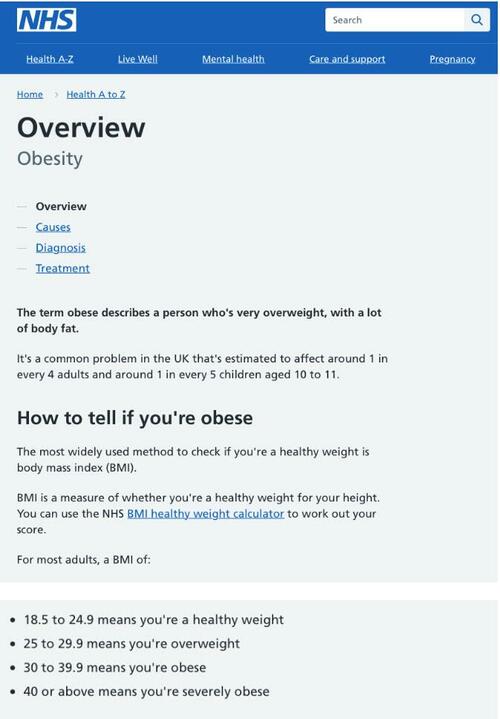
Authored by Steve Watson via Summit News,
In the latest example of science and health being overruled by woke nonsense, researchers on obesity have called for ‘hurtful’ terms such as ‘morbidly obese’ to be scrapped so as not to harm the feelings of fat people.
The Daily Mail reports that researchers published in the journal Obesity, which describes itself as ‘the premier source of information for people with obesity’, conducted a study on how often ‘negative terminology’ was used in connection with obesity.
Woke researchers call for term 'morbidly' obese to be banned because it's offensive https://t.co/2ViC6rsBy8
— Daily Mail U.K. (@DailyMailUK) June 9, 2022
In an analysis of thousands of papers, the researchers found that 16.8% used the term ‘morbid’, while 2.4% contained the word ‘fail’.
The researchers then asked a selection of fat people how they felt about that, and to no one’s surprise they said it hurt their feelings and made them cry.
One participant described the use of the word ‘morbid’ in connection with obesity as ‘chilling’, while others suggested that using ‘failure’ denotes that a lack of self control is to blame for obesity.
Huh? In the vast majority of cases it is.
The upshot of the study was that health professionals should watch their language around sensitive fatties.
Calling fatties "morbidly obese" is demeaning. https://t.co/Owvph3fn4P
— New Australian Bulletin (@newausbulletin) June 8, 2022
It concluded that instead of using ‘morbidly obese’ they should say ‘severely obese’, and instead of ‘weight loss or diet failure’ they should say ‘ineffective/insufficient weight loss’ or ‘secondary weight regain’.
Or they could say ……. " Congratulations you are in last place at being slim "
— OM (@Olliemars30) June 9, 2022
Lead author Richard Welbourn, a bariatric surgeon working at Somerset’s Musgrove Park Hospital, said “All healthcare professionals should be aware of this research and consider their use of language when talking about obesity with colleagues and patients.”
Welbourn added that “Non-judgemental, standardised terminology may help patients feel safe to engage in a conversation about weight and potential treatment options.”
Commenting on the study, Joe Nadglowski, president of the Obesity Action Coalition declared that “It’s time we prioritise better language around obesity,” adding “Poor or outdated language hurts the provider/patient relationship and ultimately keeps people with obesity from seeking or receiving care.”
Nadglowski also suggested that “sticks and stones may break my bones but words will never hurt me” doesn’t apply to obese people.
Don’t people deserve to know if they are deadly fat and risking their lives - changing the words won’t change that
— Deborah Krist (@huxleya) June 9, 2022
Critics reacted to the study by noting that ‘morbidly obese’ is a clinical term and that sugar coating (not literally) obesity is dangerous.
Christopher Snowdon, of the Institute of Economic Affairs thinktank noted that “It is called morbid obesity because a BMI of over 35 is associated with a greater risk of death, in contrast to being overweight and mildly obese.”
Snowdon added, “It is not clear why an organisation called the Obesity Society, writing in a journal called Obesity, thinks people will be unnecessarily distressed by being described as morbidly obese, but are happy to be called obese.”
“Perhaps we should just go back to calling people fat?” he suggested.
Woke researchers want the word c*nts banned as they are offended by this label applied to them. https://t.co/zQCQn5fKrv
— Winston Smith (@Orwells_lament) June 9, 2022
Two thirds of the population in both Britain and the U.S. are overweight and obesity is imminently set to surpass smoking as the biggest cause of cancer.
The strain on healthcare in both countries because of obesity is clear.
But for god’s sake don’t hurt their feelings.
On the UK National Health Service’s website the words ‘morbidly’ or ‘morbid’ have been almost entirely scrubbed from guidance on obesity, replaced with descriptions like a BMI above 40 being ‘severely obese’.
As we reported yesterday, the NHS has also altered its guidance pages on ovarian cancer, removing instances of the word “women” in a move that they say is intended to be more “inclusive” toward trans, non-binary and intersex people.
* * *
Brand new merch now available! Get it at https://www.pjwshop.com/
In the age of mass Silicon Valley censorship It is crucial that we stay in touch. We need you to sign up for our free newsletter here. Support our sponsor – Turbo Force – a supercharged boost of clean energy without the comedown. Also, we urgently need your financial support here.
Authored by Steve Watson via Summit News,
In the latest example of science and health being overruled by woke nonsense, researchers on obesity have called for ‘hurtful’ terms such as ‘morbidly obese’ to be scrapped so as not to harm the feelings of fat people.
The Daily Mail reports that researchers published in the journal Obesity, which describes itself as ‘the premier source of information for people with obesity’, conducted a study on how often ‘negative terminology’ was used in connection with obesity.
Woke researchers call for term ‘morbidly’ obese to be banned because it’s offensive https://t.co/2ViC6rsBy8
— Daily Mail U.K. (@DailyMailUK) June 9, 2022
In an analysis of thousands of papers, the researchers found that 16.8% used the term ‘morbid’, while 2.4% contained the word ‘fail’.
The researchers then asked a selection of fat people how they felt about that, and to no one’s surprise they said it hurt their feelings and made them cry.
One participant described the use of the word ‘morbid’ in connection with obesity as ‘chilling’, while others suggested that using ‘failure’ denotes that a lack of self control is to blame for obesity.
Huh? In the vast majority of cases it is.
The upshot of the study was that health professionals should watch their language around sensitive fatties.
Calling fatties “morbidly obese” is demeaning. https://t.co/Owvph3fn4P
— New Australian Bulletin (@newausbulletin) June 8, 2022
It concluded that instead of using ‘morbidly obese’ they should say ‘severely obese’, and instead of ‘weight loss or diet failure’ they should say ‘ineffective/insufficient weight loss’ or ‘secondary weight regain’.
Or they could say ……. ” Congratulations you are in last place at being slim “
— OM (@Olliemars30) June 9, 2022
Lead author Richard Welbourn, a bariatric surgeon working at Somerset’s Musgrove Park Hospital, said “All healthcare professionals should be aware of this research and consider their use of language when talking about obesity with colleagues and patients.”
Welbourn added that “Non-judgemental, standardised terminology may help patients feel safe to engage in a conversation about weight and potential treatment options.”
Commenting on the study, Joe Nadglowski, president of the Obesity Action Coalition declared that “It’s time we prioritise better language around obesity,” adding “Poor or outdated language hurts the provider/patient relationship and ultimately keeps people with obesity from seeking or receiving care.”
Nadglowski also suggested that “sticks and stones may break my bones but words will never hurt me” doesn’t apply to obese people.
Don’t people deserve to know if they are deadly fat and risking their lives – changing the words won’t change that
— Deborah Krist (@huxleya) June 9, 2022
Critics reacted to the study by noting that ‘morbidly obese’ is a clinical term and that sugar coating (not literally) obesity is dangerous.
Christopher Snowdon, of the Institute of Economic Affairs thinktank noted that “It is called morbid obesity because a BMI of over 35 is associated with a greater risk of death, in contrast to being overweight and mildly obese.”
Snowdon added, “It is not clear why an organisation called the Obesity Society, writing in a journal called Obesity, thinks people will be unnecessarily distressed by being described as morbidly obese, but are happy to be called obese.”
“Perhaps we should just go back to calling people fat?” he suggested.
Woke researchers want the word c*nts banned as they are offended by this label applied to them. https://t.co/zQCQn5fKrv
— Winston Smith (@Orwells_lament) June 9, 2022
Two thirds of the population in both Britain and the U.S. are overweight and obesity is imminently set to surpass smoking as the biggest cause of cancer.
The strain on healthcare in both countries because of obesity is clear.
But for god’s sake don’t hurt their feelings.
On the UK National Health Service’s website the words ‘morbidly’ or ‘morbid’ have been almost entirely scrubbed from guidance on obesity, replaced with descriptions like a BMI above 40 being ‘severely obese’.
As we reported yesterday, the NHS has also altered its guidance pages on ovarian cancer, removing instances of the word “women” in a move that they say is intended to be more “inclusive” toward trans, non-binary and intersex people.
* * *
Brand new merch now available! Get it at https://www.pjwshop.com/
In the age of mass Silicon Valley censorship It is crucial that we stay in touch. We need you to sign up for our free newsletter here. Support our sponsor – Turbo Force – a supercharged boost of clean energy without the comedown. Also, we urgently need your financial support here.






